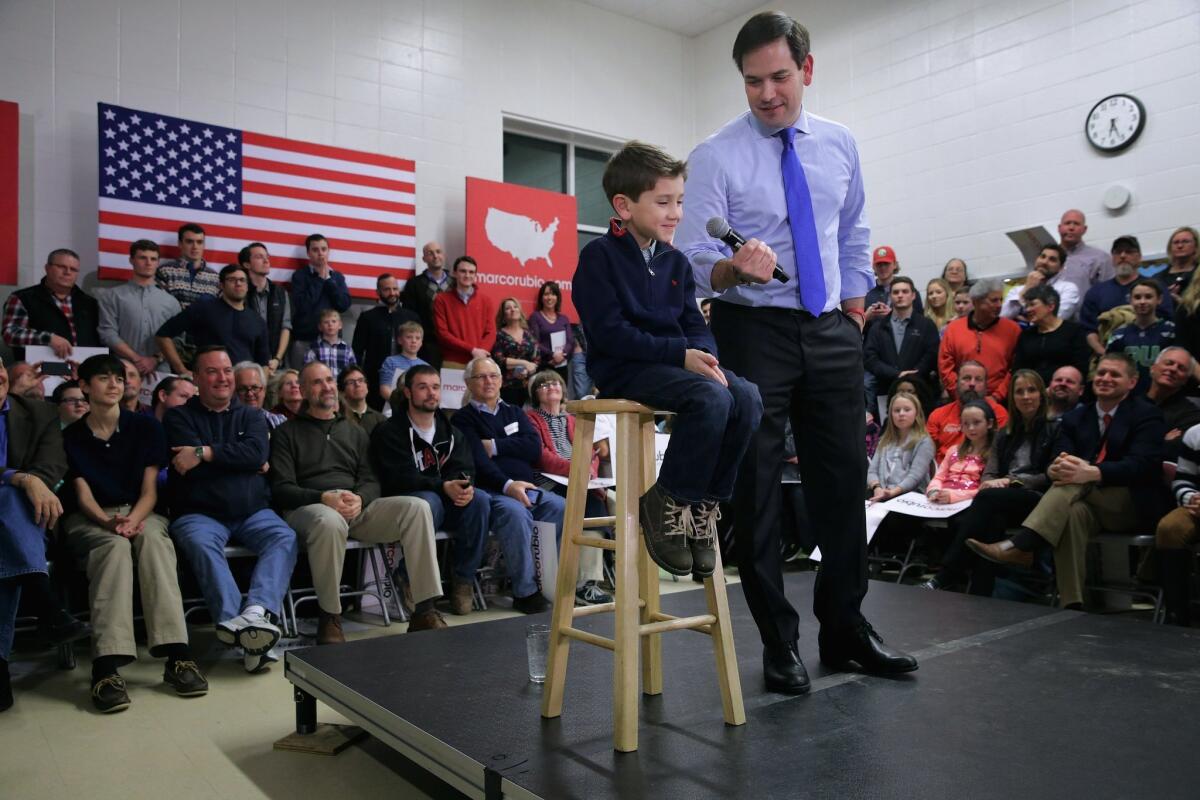Op-Ed: Small is beautiful at the New Hampshire primary

Dominick Rubio, 7, joins his father Marco Rubio on stage during a campaign town hall event at Mary A. Fisk Elementary School in Salem, N.H. Feb. 4.
- Share via
At a town hall-style meeting in New Hampshire in 2007, an American woman of Moroccan descent placed a decorative scarf over her head and confronted Tom Tancredo, a Republican presidential candidate who ran on an anti-immigration platform. “I speak the same language as the people that flew into the towers. I speak the same language as all the Iraqis we are killing,” said the woman, Siham Elhamoumi, who was a recent graduate of Saint Michael’s College in Vermont, where I teach. “Am I the enemy?”
Tancredo shot back with a question of his own: ““Do you believe that we should replace the Constitution with sharia law?”
“Do not belittle people’s opinions and people’s beliefs and people’s religions. Do not put one religion above the other,” said Elhamoumi, in an exchange that was reported in the Concord, N.H., Monitor.
For 12 years, I’ve been taking groups of journalism and political science students from St. Michael’s to witness one of the greatest spectacles of our democracy: the New Hampshire primary, which brings candidates to that small state’s small towns so voters can take their measure in person, metaphorically kicking the tires of the men and women who would be president.
New Hampshire, which holds the first primary eight days after Iowa holds the first caucus, has long been the subject of criticism: It’s not representative of America, it’s too white, it’s too northeastern, it’s too rural and it’s too small. Yes, yes, yes, yes and yes. But its small size matters: In 2012, a poll found that nearly a third of all Republican voters in the state had met at least one candidate and many had met two or more.
And even the New Hampshire voters who manage to avoid the candidates can’t avoid their family and their neighbors. They are surrounded by people who have personally assessed the men and women who would be president.
The beauty of the New Hampshire primary is the way it takes a big campaign and makes it small. Candidates have to show themselves again and again in intimate settings, where voters can put them to the test: asking questions, pushing back and influencing platforms.
The beauty of the New Hampshire primary is the way it takes a big campaign and makes it small.
In 2003, after President George W. Bush pledged $15 billion to combat HIV/AIDS, activists fanned out across New Hampshire and asked the leading Democratic candidates if they’d be willing to double Bush’s pledge. Soon enough — amazingly — each of the Democratic candidates had made the pledge.
Over the years, my students and I have seen most of the major candidates, and their in-person performances have revealed much. In 2004, we saw Howard Dean deliver a sedate speech in Portsmouth, in deep contrast to the “Dean scream” that sent him packing. We saw Joe Lieberman walk out to a stairwell in Manchester and declare, in the sleepiest of voices, that he was feeling a lot of “Joementum”; he was out of the race a few weeks later. And we saw John Edwards, the slickest candidate I’ve ever witnessed, hold forth in a high school gym and make a crowd swoon with a speech that was heavy on style and light on substance.
In 2007, we saw John McCain hold forth like a Borscht Belt comedian in New London; his biting wit, playfulness and charm correctly suggested that he would dominate his Republican rivals.
As wowed as my students were by John Huntsman at a town hall meeting in Northfield in 2011, they were frustrated by Romney on the same day in Hopkinton. Three of them asked Romney about same-sex marriage and he grew increasingly testy. Some of my less-informed students were shocked that he was so adamantly for one man, one woman unions. But it wasn’t only the policy that irked them; it was how poorly he connected with the young people in the room. Many found him dismissive and condescending, presaging, perhaps, some of the problems he had connecting with voters in the general election.
What makes New Hampshire’s up-close primary particularly worthwhile is that democracy in small doses is hard to stage-manage, despite the campaigns’ best efforts. To sit in a town-hall meeting with candidates, citizens, protesters and the media is to see the best-laid plans go awry.
After Tancredo sparred with Elhamoumi, more of my students started pushing back at the candidate’s xenophobic message. Tancredo seemed surprised at the resistance: the speech was being held at Magdalen College, a Catholic school noted then for its tiny size and ultra-conservative student body. I watched Tancredo scan the room, looking, I thought, for someone amenable to his message. He called on a young man who was, I found out later, enrolled at Magdalen. It didn’t help.
“Jesus said we should be a good host,” said the student, quoting Scripture. How could Tancredo reconcile his anti-immigrant stance with Jesus’ teachings? Tancredo ended question time quickly and exited the room. It’s safe to say that everyone there learned something that day — about the candidate, his message and their fellow voters.
New Hampshire doesn’t always choose the best or most successful nominees, but it does take its role as the small state with the first big primary seriously. And we are all better off because of it.
David Mindich, a former CNN assignment editor, is a professor of media studies, journalism and digital arts at Saint Michael’s College in Vermont. For the 2015-16 academic year, he is a visiting scholar at New York University.
Follow the Opinion section on Twitter @latimesopinion and Facebook
More to Read
A cure for the common opinion
Get thought-provoking perspectives with our weekly newsletter.
You may occasionally receive promotional content from the Los Angeles Times.










